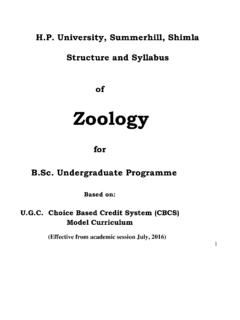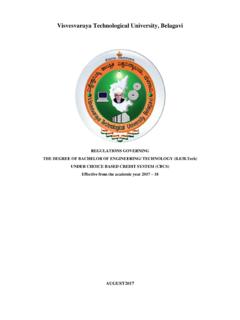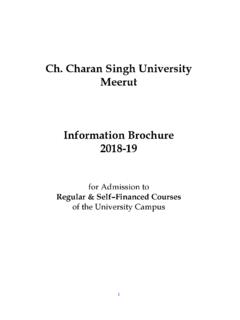Transcription of B.Com (Computer Applications)
1 ( computer applications )( cbcs ) Department of Commerce, MGU. ( computer applications ). ( 2016 2017). First year Syllabus ( cbcs ).. FACULTY OF COMMERCE, MAHATMA GANDHI UNIVERSITY. NALGONDA 508 254 ( ). 1. ( computer applications )( cbcs ) Department of Commerce, MGU. DEPARTMENT OF COMMERCE, Structure of ( computer Application) ( cbcs ) for Mahatma Gandhi University, Nalgonda. ( Academic year 2016-17). ( computer applications ) PROGRAMME. FIRST year : semester -I. Code Course Title Course Type HPW Credits (1) (2) (3) (4) (5) (6). 1. BC101 Environmental Studies AECC-1 2 2. 2. BC102 English CC-1A 5 5. 3. BC103 Second Language CC-2A 5 5. 4. BC104 Financial Accounting - I DSC-1A 5 5. 5. BC105 Business Economics DSC-2A 5 5. 6. BC106 Business Organization DSC-3A 4 4. 7. BC107 Information Technology DSC-4A 3T+2P 4. Total 31 30. semester -II. 8. BC201 Gender Sensitisation AECC-2 2 2. 9. BC202 English CC-1B 5 5. 10. BC203 Second Language CC-2B 5 5.
2 11. BC204 Financial Accounting - II DSC-1B 5 5. 12. BC205 Managerial Economics DSC-2B 5 5. 13. BC206 Principles of Management DSC-3B 4 4. 14. BC207 Relational Database Management DSE-4B 3T+2P 4. Systems Total 31 30. SECOND year : semester -III. 15. BC301 Principles of Insurance SEC-1 2 2. 16. BC302 English CC-1C 5 5. 17. BC303 Second Language CC-2C 5 5. 18. BC304 Advanced Accounting DSC-1C 5 5. 19. BC305 Income Tax-I DSC-2C 5 5. 20. BC306 Business Statistics-I DSC-3C 4 4. 21. BC307 Programming with C DSC-4C 3T+2P 4. Total 31 30. semester -IV. 22. BC401 Practice of Life Insurance SEC-2 2 2. 23. BC402 English CC -1D 5 5. 24. BC403 Second Language CC-2D 5 5. 25. BC404 Corporate Accounting DSC-1D 5 5. 26. BC405 Income Tax-II DSC-2D 5 5. 27. BC406 Business Statistics-II DSC-3D 4 4. 28. BC407 Objective Oriented Programming with C++ DSC-4D 3T+2P 4. Total 31 30. 2. ( computer applications )( cbcs ) Department of Commerce, MGU.
3 THIRD year : semester -V. 29. BC501 Practice of General Insurance SEC-3 2 2. 30. BC502 GE-1 2 2. 31. BC503 Cost Accounting DSC-1E 4 4. 32. BC504 Business Law DSC-2E 4 4. 33. BC505 Banking Theory & Practice DSC-3E 4 4. 34. BC506 Computerised Accounting DSC-4E 3T+2P 4. 35. BC507 Elective I DSE-1A 4T+2P 5. 36. BC508 Elective II DSE-2A 4T+2P 5. Total 33 30. semester -VI. 37. BC601 Regulation of Insurance Business SEC-4 2 2. 38. BC602 GE-2 2 2. 39. BC603 Managerial Accounting DSC-1F 4 4. 40. BC604 Company Law DSC-2F 4 4. 41. BC605 Financial Institutions & Markets DSC-3F 4 4. 42. BC606 Commerce Lab DSC-4F 2T+4P 4. 43. BC607 Elective I DSE-1B 5 5. 44. BC608 Elective II DSE-2B 5 5. Total 32 30. GRAND TOTAL 189 180. AECC: Ability Enhancement Compulsory Course; SEC: Skill Enhancement Course; DSC: Discipline Specific Course; DSE: Discipline Specific Elective; GE: Generic Elective; T=Theory;. P=Practicals;. SUMMARY OF CREDITS.
4 Sl. No. Course Category No. of Courses Credits Per Course Credits 1 AECC 2 2 4. 2 SEC 4 2 8. 3 CC Language 8 5 40. DSC 8 5 40. 16 4 64. 4 DSE 4 5 20. 5 GE 2 2 4. TOTAL 44 180. Commerce Total 28 124. 3. ( computer applications )( cbcs ) Department of Commerce, MGU. SYLLABUS. FINANCIAL ACCOUNTING I. Paper: BC 101 Max. Marks: 50. PPW: 6 Hrs Exam Duration: 3 Hrs Objective: to acquire conceptual knowledge of basics of accounting and preparation of final accounts of sole trader. UNIT-I: ACCOUNTING PROCESS: Financial Accounting: Introduction Definition Evolution Functions-Advantages and Limitations Users of Accounting Information- Branches of Accounting Accounting Principles: Concepts and Conventions- Accounting Standards Meaning Importance List of Accounting Standards issued by ASB - Accounting System- Types of Accounts Accounting Cycle- Journal- Ledger and Trial Balance. (Including problems). UNIT-II: SUBSIDIARY BOOKS: Meaning Types - Purchases Book - Purchases Returns Book - Sales Book - - Sales Returns Book - Bills Receivable Book - Bills Payable Book Cash Book - Single Column, Two Column, Three Column and Petty Cash Book - Journal Proper.
5 (Including problems). UNIT-III: BANK RECONCILIATION STATEMENT: Meaning Need - Reasons for differences between cash book and pass book balances Favourable and over draft balances Ascertainment of correct cash book balance (Amended Cash Book) - Preparation of Bank Reconciliation Statement. (Including problems). UNIT-IV: RECTIFICATION OF ERRORS AND DEPRECIATION: Capital and Revenue Expenditure Capital and Revenue Receipts: Meaning and Differences - Differed Revenue Expenditure. Errors and their Rectification: Types of Errors - Suspense Account . Effect of Errors on Profit. (Including problems). Depreciation (AS-6): Meaning Causes Difference between Depreciation, Amortization and Depletion - Objectives of providing for depreciation Factors affecting depreciation Accounting Treatment Methods of depreciation: Straight Line Method - Diminishing Balance Method (Including problems). UNIT-V: FINAL ACCOUNTS: Final Accounts of Sole Trader: Meaning -Uses -Preparation of Manufacturing, Trading and Profit &.
6 Loss Account and Balance Sheet Adjustments Closing Entries.(Including problems). SUGGESTED READINGS: 1. Accountancy-I: Haneef and Mukherjee, Tata McGraw Hill Company. 2. Principles & Practice of Accounting: , Sultan Chand. 3. Accountancy-I: Jain & Narang, Kalyani Publishers. 4. Accountancy I: Tulasian, Tata McGraw Hill Co. 5. Introduction to Accountancy: , and Co. 6. Advanced Accountancy-I: , Vikas. 7. Fundamentals of Financial Accounting: Deepak Sehgil, Tax Mann Publication. 8. Financial Accounting: Jawahar Lal, Himalaya Publishing House. 4. ( computer applications )( cbcs ) Department of Commerce, MGU. BUSINESS ECONOMICS. Paper: BCO102 Max. Marks: 50. PPW: 4 Hrs Exam Duration: 3 Hrs Objective: to acquire knowledge for application of economic principles and tools in business practices. UNIT-I: INTRODUCTION: Business Economics: Meaning - Nature Characteristics - Importance and Role - Micro & Macro Economics - Scope - Objectives - Law of Diminishing marginal utility - Law of Equi-marginal utility.
7 UNIT- II: DEMAND ANALYSIS: Meaning Function - Factors influencing Demand -Types of Demand -Demand Curve - Law of Demand Exceptions to the law of demand-Elasticity of Demand: Concept - Types of elasticity of demand-price, income and cross Elasticity of Demand measurement of elasticity arc and point methods Importance of various Elasticity of Demand UNIT-III: SUPPLY ANALYSIS: Law of Supply - Factors influencing Supply - Market Equilibrium- Consumer Surplus - Theory of Consumer behavior - Utility and indifference curve analysis. UNIT IV: PRODUCTION ANALYSIS: Concept of Production production function-Total Production - Marginal Production - Average Production returns to a factor- Law of Variable Proportions - Law of Returns to Scale - Isocost . Isoquants - Economies and Dis-economies of Scale. UNIT-V: COST AND REVENUEANALYSIS: Theory of Cost - Concepts of Cost - Short run and Long run cost curves - Traditional and Modern Approaches -Revenue Curves relationship between total marginal and average revenues- --Break Even Analysis Meaning Assumptions Uses and Limitations.
8 SUGGESTED READINGS: 1. Business Economics: V. G. Mankar, Himalaya Publishing House 2. Managerial Economics: Vanith Agrawal, Pearson Education 3. Business Economics: H. L. Ahuja, S. Chand & Co. Ltd. 4. Business Economics : R. K. Lekhi, Kalyani Publishers 5. Business Economics: D. M. Mithani, Himalaya Publishing House 6. Business Economics: P. N. Chopra, Kalyani Publishers 7. Essential of Business Economics: D. N. Dwivedi, Vikas Publishers 8. Managerial Economics: Varshney and Maheswari, Sultan Chand 9. Business Economics: P. K. Mehta, Tax Mann Publication. 5. ( computer applications )( cbcs ) Department of Commerce, MGU. BUSINESS ORGANISATION. Paper: BCO103 Max. Marks: 50. PPW: 4 Hrs Exam Duration: 3 Hrs Objective: To acquaint the students with the basics of Commerce and Business concepts and functions and forms of Business Organization UNIT-1: FUNDAMENTAL CONCEPTS: Concepts of Business, Trade, Industry and Commerce - Classification - Relationship between Trade.
9 Industry and Commerce - Nature of Business - Objectives of Business Functions of Business- Social Responsibility of a business - Steps to Start an Enterprise UNIT-II: BUSINESS ORGANIZATION: Forms of Business Organization - Classification - Factors Influencing the Choice of Suitable Form of Organization - Sole Proprietorship Meaning, Definition - Characteristics - Advantages and Disadvantages - Suitability of Sole Proprietorship - Partnership -Kinds of Partners - - Partnership Deed - Meaning Contents - Registration of Partnership Advantages and Disadvantages of Partnership - Suitability of Partnership - Limited liability partnership Hindu Undivided Family - Meaning - Characteristics - Advantages and Disadvantages - Co-Operative Organization . Characteristics -Types of Co-Operative Societies - Limitations of Cooperatives. UNIT-III: FORMATION OF JOINT STOCK COMPANY: Joint Stock Company - Meaning - Definition - Characteristics - Advantages and Disadvantages - Kinds of Companies -Promotion - Stages of Promotion - Promoter - Characteristics - Kinds - Preparation of Important Documents - Memorandum of Association - Clauses - Articles of Association - Contents Prospectus - Contents Red herring Prospectus- Statement in lieu of Prospectus.
10 UNIT-IV: SOURCES OF FINANCE: Industrial Finance - Long Term and Short Term Finance - Fixed and Working Capital Finance - Sources of Corporate Finance ( A brief introduction to Shares and Debentures, Retained Earnings, Underwriting, Inter Company Investments and Venture Capital, Angel Investors, lease, hire purchase, franchising) . UNIT V: STOCK EXCHANGE AND MUTUAL FUNDS: Stock Exchange, Functions Working of Stock Exchanges, Mutual Funds Importance, Functions, Types Role of SEBI in Regulating Stock Exchanges and Mutual Funds in India SUGGESTED READINGS: 1. Business Organization & Management: Sharma Shashi K. Gupta, Kalyani Publishers 2. Business Organization: Sharma Shashi K. Gupta, Kalyani publishers. 3. Organization & Management: R. D. Agarwal, McGraw Hill. 4. Modern Business Organization: Sherlekar, Sherlekar, Himalaya Publishing House 5. Business Organization & Management: Basu, Tata McGraw Hill 6. Business Organization & Management: R.







